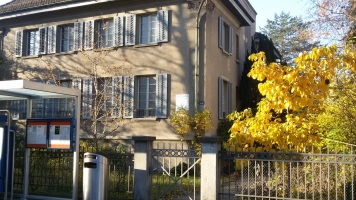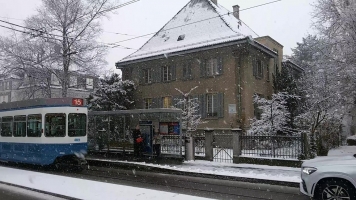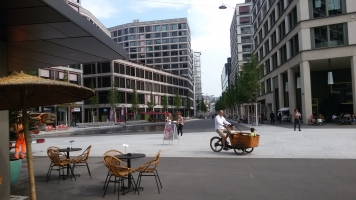Author Archives: Swiss-Immigration-Lawyer-Zurich-Bern-Basel-Geneva-Lausanne
Brexit: Switzerland & UK Memorandum of Understanding | Cooperation on Migration
Switzerland and the United Kingdom (UK) have longstanding and close relations. These are based on similar ideas on topics such as the rule of law, fundamental freedoms, social and economic order and good governance. A particular focus is on economic and financial market issues.

About me / Resume / Professional Experience
Our law firm is located in the heart of Zurich. We advise and represent foreigners in migration law and offer comprehensive legal advice regarding residence, work and settlement permits. In addition, we are available to assist you in immigration law and appeal proceedings throughout Switzerland.
lic. iur. Sara Brandon-Kaufmann Attorney at Law LL.M., is admitted to the Swiss Bar Association (SAV) and authorized to represent clients before all authorities and courts including the Federal Supreme Court of Switzerland.
As an attorney and lawyer, I have been solving everyday and complex legal cases for over twenty years. I will be ready to help you analyze the core underlying issues. Talk about your problems, formulate your questions and get advice at an early stage.
General practitioner with a particular focus on administrative and social security law: foundation law, pension funds and occupational benefits, AHV contribution law, inheritance law, business law, insurance law and contract law.
Sara Kaufmann was born and raised in Zurich-Wipkingen. After graduating from high school she studied at the University of Zurich. As a lawyer she worked in various positions in courts, judiciary and public prosecutor’s office, private and state institutions.
EDUCATION:
2013 Master of Laws (LL.M.) UBC
2005 Leader management training in Zurich
2001 Acquisition of the license to practice law (Bar Admission )
1995 Study of law at the University of Zurich
1988 Matura type D at the Cantonal High School Stadelhofen Zurich
PROFESSIONAL SCOPE:
2014-2017 | Legal service of the compensation Fund of the SVA Zurich (contribution law, calculation and payment of AHV/IV benefits, supplementary benefits and consumption/depletion of assets)
2008-2011 | Legal service of the Social Insurance Institution of the Canton of Zurich (employer liability, AHV contributions, liability of governing bodies for unpaid AHV contributions, reimbursement and remission procedures, payment agreement, request for payment in installments/deferments of contributions)
2005-2006 | Zürcher Kantonalbank (training for pension fund managers, executive bodies & boards of trustees)
2004-2006 | Office for occupational pensions and foundations of the Canton of Zurich (pension fund supervision)
2003 | Business law firm Zurich (civil law, corporate law, commercial administrative law, asset recovery, mutual legal assistance and international arbitration)
2001-2003 | Chief Public Prosecutor of the Canton of Zurich (white-collar crime, economic delinquency & money laundering proceedings)
1997-2001 | District Court of Zurich (inheritance matters, matrimonial / marriage protection, labor court, bankruptcy and inheritance)
1996 | Directorate of Justice and of Internal Affairs -> Department of Justice of the Canton of Zurich
MEMBERSHIP:
Swiss Bar Association SAV / FSA
(Schweizerischer Anwaltsverband) www.sav-fsa.ch
Zurich Bar Association (Zürcher Anwaltsverband www.zav.ch)
Democratic Lawyers Zurich (DJZ www.djz.ch)
Entered in the Register of Attorneys of the Canton of Zurich ( Higher Court of the Canton of Zurich ).
Entered in the Cantonal Register of Lawyers by decision of the Supervisory Commission over the attorneys at law.
Appeal against non-extension / losing of the residence permit ( Aufenthaltsbewilligung Ausweis B)
If a foreign national is refused a residence permit, he or she may, under certain conditions, lodge an appeal against the final cantonal decision with the Federal Supreme Court. The prerequisite is, of course, that the general requirements for an appeal, such as compliance with the appeal procedure, etc., are met.
The administrative court appeal is only admissible if there is a claim to a residence permit. However, according to the case law of the Federal Supreme Court, the requirement of a claim to a residence permit can be waived by way of exception – contrary to the wording of the law.
Appeal against the annulment of a simplified (facilitated) naturalization
According to Art. 15 of the Universal Declaration of Human Rights of 1948, everyone has the right to a nationality. Nationality cannot be arbitrarily revoked.
Declaration of nullity of a naturalization and revocation of Swiss citizenship. According to Art. 36 of the Federal Act on the Acquisition and Loss of Swiss Citizenship (Citizenship Act, BüG; SR 141.0), a naturalization can be declared null and void up to eight years after naturalization has taken place. The procedure for the annulment of naturalization is always initiated when the SEM is notified of sufficient evidence of suspicion. It is directed against all naturalized or re-naturalized persons residing in Switzerland or abroad.
The annulment of naturalization can be appealed before the Federal Administrative Court within thirty days of the date of notification of the decision.
Topics: Nullification of a naturalization, Nullification of naturalizations, Appeal, Appeal, Appeal, Counsel, Facilitated naturalization annulment, Naturalization procedure, Naturalization appeals, State Secretariat for Migration SEM, Questions, Suspected sham marriage, Fake False Bogus Fictitious Fraudulent marriage, Swiss passport revoked . . . .
Initial interview and our legal fees
The first meeting
Before the first interview, you should collect important documents and note down questions and ambiguities.
Think about how you can describe your personal situation to me.
Bring all the necessary documents with you.
The first interview includes:
-
Mandate and granting of power of attorney
-
First assessment of the opportunities and risks of the case
-
Adding files resp. File inspection request
-
Show the next steps and what you can do yourself
-
Costs for legal efforts, court and other fees
-
Explanations for the billing of services rendered
—————————————————————————–












